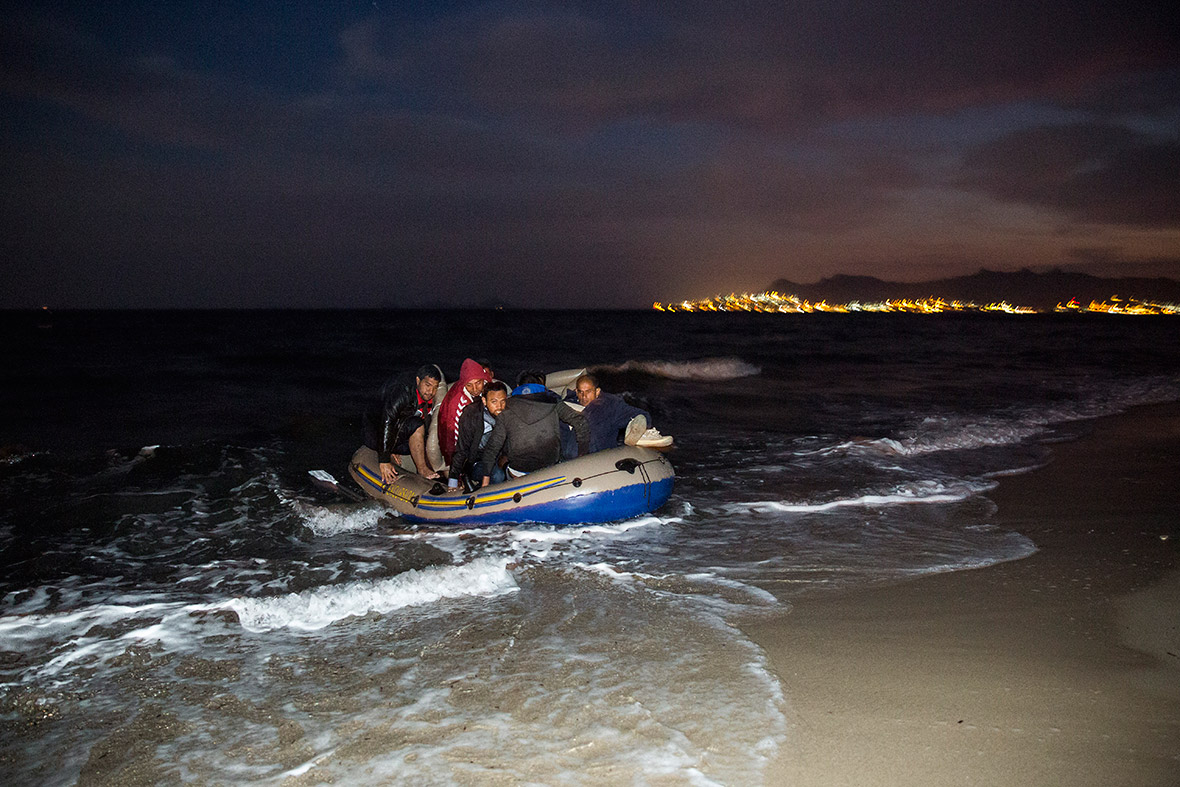Mediterranean migrant crisis: Kos, the island where the human tide arrives in a child's dinghy [Photo report]
Thousands of desperate refugees fleeing war and violence in Syria and Afghanistan have been arriving on the Greek island of Kos after a perilous sea voyage from Turkey. Greek authorities estimate more than 6,000 people have made the crossing in the past two months.
Many have paddled across in cheap inflatable dinghies more suited to a suburban swimming pool than the open sea. Some have made it on to the island's beaches, while others have had to be rescued by coastguard patrol boats.
Getty Images photographer Dan Kitwood is in Kos, covering the story. As dawn broke, he captured dramatic landings on the beach.
He told IBTimesUK: "It seems the tactics of the migrants and the smugglers have changed somewhat. Last week there were many landings in the mornings, but now they are arriving well before dawn in total darkness. I would imagine that is both to evade the Turkish police catching them leaving, and to sneak past the Greek authorities who I think they believe will take them back to Turkey if they catch them."












After arriving, the migrants are taken to a filthy abandoned hotel that has been allocated to them as a temporary shelter.
Kitwood says conditions in the hotel are deteriorating fast. He said: "It is becoming a real mess. They have running water but that is about it. It is small, with broken glass and loose wires everywhere. Every bit of space is used, with two or three families to every room.
"Some of the men have been sweeping up and trying to clear it up a bit, but the real problem is the stagnant water, mosquitoes and overflowing toilets. There is little they can do about the situation without some real help."








The migrants typically face an agonising wait to find out if they will be granted refugee status. Kitwood says it is unclear how long the migrants will have to wait for their travel documents. "I spoke to many people who have been here for six days," he said. "Every day they make their way down to the police station to queue for papers to assist with their onward journey."






Kos is a tiny island, just 4km (2.5 miles) from Bodrum on the Turkish mainland. Turkey's position as a bridge from Asia to Europe makes it the ideal transit point for migrants from the Middle East and as far afield as Africa and South Asia.
Tourism is the island's main source of income. However, recent newspaper stories suggesting migrants are "spoiling the atmosphere" for holidaymakers have put tourists off. Enquiries for accommodation on the Greek island have fallen by 52% in the past week, according to a Daily Telegraph report.








The European Commission has proposed a plan to redistribute migrants reaching Italy and Greece, which are struggling to deal with thousands of immigrants. Under the plan, Germany and France, two of the EU's biggest states, would together take nearly 40% of the 40,000 migrants.
However, the two countries released a statement saying the plan does not take fair account of the number of refugees they already take on. The statement pointed out nearly three-quarters of EU asylum applications are made in five member states: Germany, France, Sweden, Italy and Hungary. Interior ministers are due to discuss the plan on 15 and 16 June.
Denmark, Ireland and Britain have exemptions on EU matters on immigration and the latter has said it will not participate in the relocation scheme or a separate EU plan to resettle 20,000 refugees from outside the bloc.


As summer progresses and more migrants arrive, more pressure will be placed on Kos. It remains to be seen if the island will weather the storm.
Summing up the situation, Kitwood told IBTimesUK: "As a photographer for Getty Images, it is part of my role to bring these important issues of refuge and humanity to the world's attention.
"You have to question what it is that motivates someone to leave everything behind, to risk their life and that of their family, to endure conditions like this. It is vital the world sees the reality of the situation, and considers what drives migration, and also important that they understand the pressures put upon the tiny island of Kos."
© Copyright IBTimes 2025. All rights reserved.




















